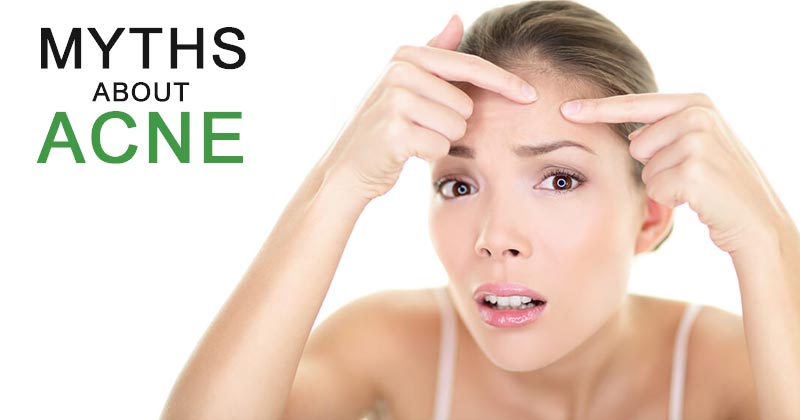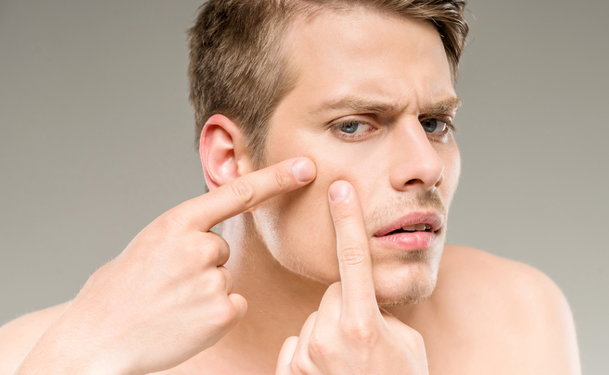People of all races suffer from acne, In the US 85% of everyone aged between 12-24 develop some form of acne, that amounts to 17 million people making it the most common form of skin disease.
In the UK 80% of 11-30 year olds will suffer from acne at some point.
Acne symptoms tend to disappear for the majority of people when they reach their 30�s, however people can still suffer from acne well into their 40�s & 50�s.
Acne is a disorder resulting from the action of hormones on the skins oil glands, known as sebaceous glands, which leads to plugged pores and outbreaks of lesions more commonly known as pimples or zits. They tend to appear on the face, neck, back, chest & shoulders.
Doctors believe that acne results from several related factors rather than one single cause. One of the most important factors is an increase in hormones called androgens, a male sex hormone. These increase in both boys & girls during puberty and cause the sebaceous glands to enlarge making more sebum.
Hormonal changes related to pregnancy or starting or stopping birth control pills can also cause acne.
Heredity or genetics is another factor and researchers believe that acne can be inherited from parents. Studies have shown that many school age boys with acne have a family history of the disorder.
Certain drugs containing androgens or lithium can cause acne. A side effect of steroids can be acne.
Greasy cosmetics can alter the cells of the skin follicles and make them stick together causing plugs which can lead to acne.
Factors which can also cause acne are:
- Friction caused by leaning on or rubbing the skin.
- Squeezing or picking at blemishes.
- Hard scrubbing of the skin.
- Environmental irritants such as pollution & high humidity.
- Changing hormonal levels in adolescent girls & adult women 2-7 days before their menstrual period starts.
- Pressure from bike helmets, backpacks or tight collars.
Myths about causes of acne include.
- Greasy foods & chocolate are often blamed for acne, but what we eat seems to have little effect.
- Acne is cause by dirty skin is another common myth however blackheads & other acne lesions are not caused by dirt.
- Stress is often blamed but has no effect in regards to the condition.
Acne treatment
There are 2 ways to treat acne, topical (applied to the skin) or systematic (taken by mouth). Both over the counter (OTC) meaning no prescription is necessary & prescription remedies are available. The goals of treatment are to heal existing lesions, to prevent new lesions forming, stop scarring & minimise psychological stress & embarrassment caused by the disease. Drug treatment is aimed at reducing several problems that play a part in causing acne: abnormal clumping of the cells in the follicles, increased oil production, bacteria & inflammation.
Depending upon the extent of a persons acne it is recommended to try one of several OTC medicines that are topical (applied to the skin) or systematic (taken by mouth) or a combination of both. For prescription remedies you must see your doctor.
Prescription topical medicines can result in side effects, the skin may look worse for a while before hopefully improving. Other side effects include stinging, burning, redness, peeling, scaling or discoloration of the skin.
Similarly some prescription oral medicines can have side effects such as increased tendency to sunburn, upset stomach, dizziness or light-headedness & changes in skin colour. Also some drugs decrease the effectiveness of birth control pills making it necessary to use a backup birth control method.
(c) John Mac 2006




Top Three Acne Spot Treatment Solutions You Can Use to Kill Your Zits Now
There are many an acne spot treatment that will claim to clear up your acne overnight.� Unfortunately, many of these claims only lead to acne sufferers becoming victims of a good marketing strategy.� Tell me, did that last spot treatment you bought clear up your acne?� Probably not, or you wouldn't be looking for an acne spot treatment right now.
Read More
How To Find Acne Treatments That Work
You don't have the time and money to waste on ineffective acne cures. But how do you find an acne treatment that works? Finding a treatment that works is a matter of matching the right remedy with the acne-causing factors in your particular case. Whether you use homemade remedies, over-the-counter acne treatments, or prescription medicine from a dermatologist, knowing what causes acne and what treatments are available will save you time and money when searching for an acne cure.
Read More
Best Treatment for Acne: Three Great Treatments
Before you go spending hundreds of dollars on an Accutane prescription,several more on birth control pills, or waste your time trying acnetreatments that don't work, take time to evaluate what your skin reallyneeds.� For instance, is your acne chronic? Hormonal? Stress-related?�Or do you have no clue as to what's causing it?� The cause of the acneis oftentimes what dictates how you should pick an acne treatment.�However, the following are all considered the best treatment for acnein many respects, no matter what the cause.
Read More
Acne Prone Skin Care: What's Causing Your Acne, and How to Fix It
Have you ever stopped to wonder what lifestyle-related activities might be causing your acne?� I'll give you a hint; it's not just things like eating chocolate and having oily skin that lead to nasty red bumps on your face, chest, and back; there's lots of other factors that come into play with your acne.� Here's some of the causes of acne that you might not know about, as well as a solution for acne prone skin care that you might want to look into.
Read More
This Article was written by : John Mac, Discuss about Health Articles, it was published at June 4, 2006 and was updated at
Comments
Post a Comment